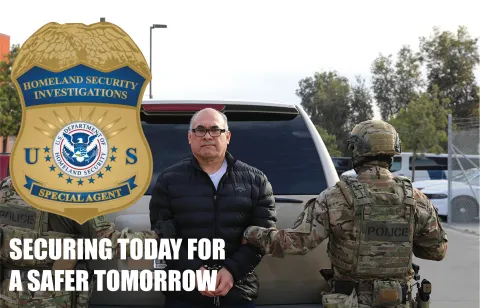Cartel Leader wanted for homicide and other acts of violence turned over to Mexican authorities
HARLINGEN, Texas — The former head of the notorious Gulf Cartel, Osiel Cardenas-Guillen, 57, was turned over Dec. 16 to Mexican law enforcement officials by U.S. Immigrations and Customs Enforcement’s (ICE) Enforcement and Removal Operations (ERO) officers at the San Ysidro Port of Entry. He is wanted in Mexico for homicide and other acts of violence. This case was conducted by Homeland Security Investigations (HSI) with assistance from DEA, FBI and cooperation from the United States Marshals Service and the Cameron County Sheriff’s Office.

The former Gulf cartel leader was transferred to the custody of Mexican authorities without incident. On Aug. 30, he was released from prison and turned over to ICE custody and sent to the Otay Mesa Detention Center, San Diego, California, where he remained until his removal.
“Today marks the closing of a significant chapter in our ongoing fight against drug cartels in South Texas and throughout the U.S. The return of this cartel leader to Mexico, after serving a lengthy sentence in a U.S. prison, sends a powerful message to those who think they can evade justice. The consequences of their actions are lifelong, and no matter how powerful they may feel, they are not untouchable,” said HSI San Antonio Special Agent in Charge Craig Larrabee.
Case Background
While head of the Gulf Cartel, Cardenas-Guillen oversaw a vast drug trafficking empire responsible for the importation of thousands of kilograms of cocaine and marijuana into the United States from Mexico. The drugs smuggled into the country under Cardenas-Guillen’s watch were further distributed to other areas of the country, including Houston and Atlanta, Georgia. From July 2000 through September 2001, more than 2,000 kilograms of cocaine directly attributable to Cardenas-Guillen was seized by United States law enforcement. The distribution of these vast quantities of cocaine and marijuana generated millions of dollars in drug proceeds which flowed south to the Rio Grande Valley of South Texas and ultimately into Mexico. Drug ledgers seized in Atlanta in June 2001 indicated that the Gulf Cartel generated more than $41 million in drug proceeds over a three-and-a-half month period in the Atlanta area alone. Cardenas-Guillen used violence and intimidation as a means of furthering the goals of his criminal enterprise. The three-year investigation led to his indictment and subsequent arrest and conviction.
The U.S. Department of Justice’s Office of International Affairs worked with the Government of Mexico to secure his arrest and extradition. Subsequently, on Jan. 19, 2007, Mexico extradited Cardenas to the United States to stand trial in the Southern District of Texas. On Jan. 19, 2007, U.S. Customs and Border Protection paroled Cardenas into the United States at the Houston port of entry until Jan. 18, 2008, while under U.S. Marshals Service custody. The Marshals Service transferred Cardenas to the Federal Correctional Facility, La Tuna in Anthony, Texas.
On March 3, 2010, the U.S. District Court for the Southern District of Texas in Houston convicted Cardenas-Guillen of conspiracy to possess with intent to distribute more than five kilograms of cocaine and more than 1,000 kilograms of marijuana, conspiracy to launder monetary instruments, and threatening to assault and murder a federal agent. On Feb. 24, Cardenas-Guillen was sentenced to serve 25 years in federal prison without parole and forfeited $50 million in proceeds from his illegal enterprise. He plead guilty to the charges and was sentenced the same day.
Immigration Background
Cardenas entered the U.S. on Aug. 27, 1992, in Brownsville, Texas using a Border Crossing Card which permitted a temporary stay within 25 miles of the U.S./Mexico border. On that same date, Cardenas was arrested for possessing with intent to distribute, approximately two kilograms of cocaine. Cardenas was transferred to Cameron County Jail in Brownsville, Texas.
On Jan. 13, 1993, the U.S. District Court for the Southern District of Texas in Brownsville convicted Cardenas for possessing with intent to distribute, a quantity exceeding 500 grams, that is, approximately two kilograms gross weight of cocaine and sentenced him to 63 months incarceration.
On Dec. 23, 1993, Cardenas transferred to Mexico under the Treaty between the United States and Mexico on the Execution of Penal Sentences. On March 14, 2000, the U.S. Attorney’s Office in Houston filed an indictment against Cardenas for 13 counts of possession with intent to distribute cocaine and marijuana, six counts of assault on a federal officer, one count of laundering monetary instruments, one count of conspiracy to import into the United States from Mexico cocaine and marijuana, and one count continuing criminal enterprise.
On Feb. 16, 2022, ERO Chicago encountered Cardenas at USP Terre Haute and lodged an immigration detainer.
On July 3, ERO Mexico City notified ERO Chicago that Cardenas had several active arrest warrants in Mexico.
On Aug. 5, ERO Chicago served Cardenas with a notice of intent to issue a final administrative removal order, citing federal aggravated felony convictions, as amended, in that, at any time after admission, you have been convicted of an aggravated felony, an offense relating to the illicit trafficking in a controlled substance, including a drug trafficking crime.
The HSI San Antonio area of responsibility (AOR) covers more than 500 miles of border with three Deputy Special Agent in Charge locations: Rio Grande Valley, Laredo, and San Antonio. Combined, these offices respond to 22 ports of entry (18 land, three air and one sea), several railroad bridges/yards, seven U.S. Border Patrol checkpoints, and numerous state, local and federal law enforcement agencies within the AOR.
Learn more about HSI San Antonio’s mission to increase public safety in South Texas communities on X, formerly known as Twitter, at @HSI_SanAntonio.
